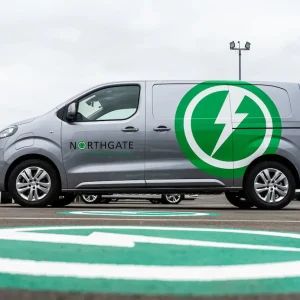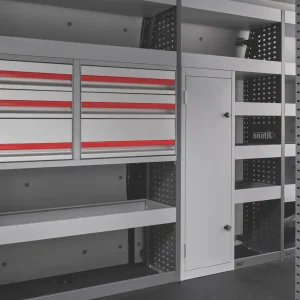
Formed in 1987 to cater to the specialist needs of company car and van drivers, Kwik Fit has become a trusted name for fleets across the UK. With a network of centres covering the country, long opening hours and highly-trained technicians, Kwik Fit ensures the maintenance of over two million vehicles annually through its centres and Kwik Fit Mobile’s fleet of mobile tyre-fitting vehicles.
Dan Joyce, who started as an apprentice technician with Kwik Fit 18 years ago, has been pivotal in enhancing the company’s fleet service, maintenance and repair (SMR) offerings since becoming fleet director in April 2020. Recently promoted to retail operations director, Joyce now oversees around 700 centres under both the Kwik Fit and STS Tyre Pros brands, while retaining responsibility for Kwik Fit’s fleet operations.
Through strategic investments in technology and customer service infrastructure, Joyce ensures that fleets under his supervision receive a consistently high level of service. The fleet division offers a comprehensive range of services, including tyre repair and replacement, MOT testing, servicing, batteries, aircon recharging and brake repairs.
Commitment to safety
Kwik Fit’s dedication to driver safety has earned it recognition within the industry. “Keeping our customers safe on the road and providing peace of mind motoring is our north star,” Joyce explains.
MOTs now also play a significant role in Kwik Fit’s business, with the company offering this service at more than 500 of its 700 centres, conducting approximately 100,000 fleet MOTs annually, making it the leading MOT provider in the UK.
Although supply issues affecting the availability of new vans have eased, they have not done so as quickly as in the car market, resulting in fleet customers running their vans for longer and managing vehicles that are older than they would have been a few years ago, Joyce tells us. “Consequently, preventative maintenance has become even more of a focus for fleet managers, which is where we come in,” he continues.
Digital innovation for fleets
Although vans are often being driven for longer, a recent digital shift in the industry has enhanced the duty of care fleets offer to their drivers. Joyce explains that an emphasis on digital innovation has seen the launch of the Kwik Fit ‘Fleet Bookings’ website, catering specifically to fleet customers. “This platform mirrors the retail experience on KwikFit.com but is tailored to fleet policies,” Joyce notes. Fleet customers can conveniently book tyre services at centres or opt for a mobile fitting service, receiving regular tyre and health checks.
The correlation between tyre offerings and the safety of fleet drivers is crucial to Kwik Fit’s mission. Fleet customers benefit from the expertise of specialist tyre technicians operating dedicated mobile vans equipped with tyre-changing and balancing technology. “Booking a service is hassle-free,” explains Joyce, “with customers simply choosing a tyre and appointment time, and Kwik Fit’s team arrives at their home or workplace.”
While Kwik Fit has traditionally been recognised for its ‘fast fit’ service, the evolving complexity of tyres necessitates a digital approach, Joyce tells us. With an extensive online stock, customers can order specific tyres, ensuring the company continues to meet expectations for fast and efficient service.
“Most of our sites keep 900 different tyres in stock but there are so many different tyres in the market now that it’s usually a case of customers having to order their specific tyre from our online stock,” Joyce says.
Training the next generation of technicians
A transformative shift in the automotive landscape impacting Kwik Fit is the adoption of EVs and the broader trend toward decarbonisation. In response to this evolution, Kwik Fit has proactively embraced various EV strategies, including implementing training programmes to ensure its network of technicians are well-equipped to maintain EVs.
According to Joyce, EVs are reshaping maintenance norms and significantly differ from traditional ICE vehicles. “We’ve dedicated substantial efforts to enhance the expertise of over 700 technicians, enabling them to proficiently work on EVs and provide services comparable to those offered for conventional vehicles,” he says.
The integration of the IMI accredited scheme into Kwik Fit’s training initiative has led to a notable upskilling of technicians in terms of EV awareness and capability.
Joyce states: “Our comprehensive training courses cover every facet of our centre operations, ranging from wheel alignment to MOT testing. Designed to blend theory with practical application, our training equips our team with the knowledge and experience needed to uphold high standards in [vehicle] maintenance.”
Joyce emphasises, “The apprenticeship program is designed to equip trainees with the essential skills and knowledge to thrive in the automotive industry. We take pride in our unwavering commitment to training and developing our personnel, a practice crucial in ensuring we consistently deliver a superior service level to all our customers.”
Ultimately, Joyce notes, “It is our customers who determine our success,
and their continued return to us is a testament to our achievements in meeting their expectations.”
Electrifying changes
Tyres remain a cornerstone of Kwik Fit’s business, with over four million sold annually, including 1.2 million fitted to fleet vehicles. Supported by the largest tyre distributor in the UK, Kwik Fit stocks a diverse range of tyres to fit virtually any vehicle.
The company’s sustainable fair trade proposition sources natural rubber from Indonesian plantations, supporting an environmentally friendly supply chain. “We have a sustainable fair trade tyre production proposition where our parent group sources natural rubber from plantations in Indonesia and sells it to tyre manufacturers who make tyres using that rubber, then we wholesale, distribute, fit and recycle those tyres,” explains Joyce.
In addition to ensuring proficient SMR services for EVs, the company has delved into understanding the specific tyre requirements and behaviours associated with EVs, distinguishing them from those fitted on ICE vehicles.
Although vans are becoming electrified at a much slower rate than cars, tyres on electric vans is something that Joyce believes will need to be considered in the coming years.
According to Joyce, there are prevalent misconceptions surrounding EV tyres, and the company has debunked these myths through data collected from fitting over 100,000 tyres on EVs in the last five years. Initially, the data revealed a significant increase in tyre wear on EVs compared with ICE vehicles, given inherent factors such as the weight of EVs, lighter tyre design for range conservation, and higher torque resulting in more substantial tyre wear.
While it remains true that EV tyres wear down faster than those on ICE vehicles, Joyce notes a considerable narrowing of the gap. “Today, there is almost parity between tyre wear on an EV and an ICE. The performance of a tyre depends on various factors, with driving conditions being one of the most significant,” he explains.
Joyce provides an example of a tyre fitted to a city EV, which undergoes frequent braking and cornering, compared with one primarily driven on the motorway by someone aiming to preserve range, likely driving in the slow lane. “Our extensive
data now reveals that while EV tyres do wear slightly quicker, it’s not as pronounced as we initially predicted.”
Due to how vans are typically used compared with cars, with higher mileage but multiple short journeys per day, Joyce notes that there is a much greater demand on components such as tyres, brakes and shocks: “For example, our data shows that the tyre replacement rate on fleet vans is over four times that for cars on a per annum basis.
“Vans tend to be business critical with any downtime costing the operator lost revenue. Through the size of our network, Kwik Fit can help minimise this downtime as around three quarters of our centres can accommodate LCVs with many open seven days a week.”
This allows operators to both plan their preventative maintenance to suit their own schedules, but also to be close to a centre if they have an unplanned requirement. “As we offer a full range of services, operators can plan their maintenance to cover a number of different components in one visit, rather than requiring multiple appointments and therefore repeated periods of downtime,” Joyce notes.
Kwik Fit is making significant investments to meet the changing makeup of the van market. “We are seeing larger vans being increasingly used and have been investing in larger ramps to accommodate vans up to 5.0-tonnes,” says Joyce. In addition, Kwik Fit upskills its technicians to service electric vehicles. He continues, “While currently much of the demand for EV work is from owners of cars, we expect to see growing demand in the van sector for EV capability.”
Anticipating continued growth as a company, Kwik Fit recently inaugurated a new office outside Glasgow, the home of the company’s fleet tyre management customer support centre. Kwik Fit has opened five new centres in the past 12 months, and while focusing on expansion, the company remains committed to sustainable practices, incorporating solar panels and EV charging stations in some centres to support the ongoing growth of electric vehicles. “Not only are we equipped to service and repair EVs, we’re also supporting their continued growth.”
Expanding its mobile services, Kwik Fit is set to introduce additional vans and technicians this year to complement its already strong 180-van fleet for tyre fitting. Additionally, the company has introduced the ‘Kwik Fit Club’ subscription service for corporate and B2B customers, responding to the rising demand for subscription-based motoring services. Joyce explains that the service, initially piloted in 2021, addresses the needs of customers without existing SMR contracts, offering certainty over motoring costs.
Joyce says Kwik Fit’s corporate and B2B customers have increasingly highlighted the need for a solution to support vehicles financed or leased without maintenance contracts, and grey fleets. He says, “Kwik Fit Club has proved to be attractive to private drivers who want as much certainty as possible over their motoring costs. This is obviously also relevant to those businesses running fleet vehicles without maintenance contracts, so it makes perfect sense to extend Kwik Fit Club to those customers.”
Kwik Fit aims to be the preferred service provider for a diverse range of fleets, catering to company cars and vans, end-user fleets, salary sacrifice programs, job purpose vehicles, and more. Joyce outlines the company’s vision of growth, providing comprehensive solutions to all fleets, whether on-demand, digitally, or through contact centres.
Alongside the transition from ICE vehicles to EVs, companies are broadening their fleet options, with an increased focus on micro-mobility. Kwik Fit recently announced
the acquisition of Fettle, an innovative bicycle servicing company, to support
the increasing number of businesses using fleets of e-bikes and e-cargo bikes for ‘last mile’ delivery and service solutions.
Acknowledging the dynamic challenges in the automotive landscape, Joyce emphasises the importance of keeping pace with market and technological changes now more than ever. “As vehicles become more technologically advanced, Kwik Fit remains committed to delivering innovative solutions and addressing the evolving demands of the tyre industry, all while ensuring a skilled and adaptable workforce,” he concludes





